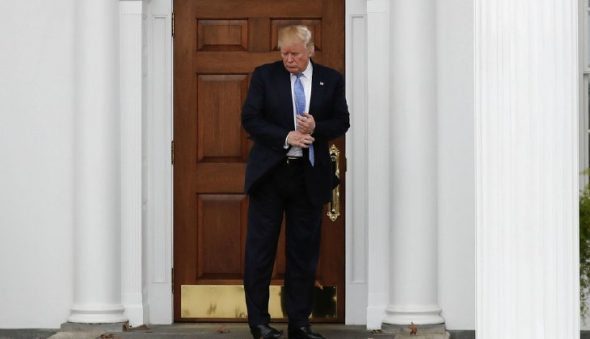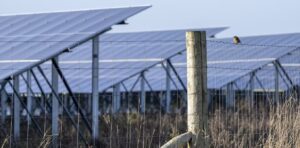
In a Presidential Transition video update, Donald Trump vows he will cancel “restrictions on the production of American energy – including shale energy and clean coal” and says this will create “millions of jobs” — his latest claim suggesting the coal industry is capable of being revived.
However, most analysts believe that no matter how much Trump waves his magic wand there’s not much he can do to revive the prospects for thermal coal, and – at best – may simply slow its decline.
Back in late May Robert Murray, the CEO of the major US coal producer Murray Energy, told a coal industry conference that the week before he had been summoned by Donald Trump to discuss energy policy options. Murray, who has a long history of generously funding Republican candidates, was happy to oblige as Trump had become the presumptive Republican nominee.
Murray recounted he suggested Trump should help increase US Liquefied Natural Gas (LNG) exports in order to reduce the domestic gas glut.
Murray, who has no interests in US gas production, wasn’t being charitable towards another industry struggling with low prices. The domestic gas glut has driven domestic prices down so far coal has become uncompetitive. Exporting gas currently consumed domestically would simply ensure less competition for Murray Energy’s coal.
Murray said Trump liked the idea but asked “What’s LNG?”
Despite Trump’s rudimentary understanding of energy issues Murray told SNL Trump was “the horse to ride” in the campaign for US President.
And ride he did.
A few weeks after his meeting with Trump, Murray personally hosted a fundraising dinner with Trump which reportedly attracted 1200 attendees.
Following Trump’s November 8 election win, Murray put together a briefing note on what he should do on assuming office.
While Murray declined to disclose the details of his note to Trump he told the energy industry trade publication SNL “the first steps are that he’s got to deal with the bloated, overgrown bureaucracy in Washington … He’s got to cut the U.S. EPA staffing to half. The same for the Department of Labor, the same for Interior, the same for the Federal Mine Safety and Health Administration.”
Murray also suggested abolishing the US Department of Energy, axing the near- completed Department of Interior Stream Protection Rule regulating mountaintop mining’s destructive impact on streams, and withdrawing from the Paris climate change accord.
Much of Murray’s wish-list is an echo of the deregulatory agenda Trump unveiled in his ‘America First Energy Plan’, though what of it originated with Murray in the first place is impossible to know. In his broad-brush policy outline Trump flagged he wanted to lift the moratorium on federal land coal production and withdraw from the Paris Agreement as part of a pledge to “save the coal industry.”
In an echo of coal industry’s coded rhetoric, Trump proclaimed he wanted to “pursue all forms of energy.”
“This includes renewable energies and the technologies of the future. It includes nuclear, wind and solar energy – but not to the exclusion of other energy. The government should not pick winners and losers. Instead, it should remove obstacles to exploration,” his policy stated.
With a hat-tip to public concern about the impact of dirty energy, Trump proclaimed “from an environmental standpoint, my priorities are very simple: clean air and clean water.” He also vowed, “policy decisions will be public and transparent.”
Why is the coal industry extolling the virtues of “tempered” exuberance?
Following Trump’s election win his coal industry supporters were ecstatic. The West Virginia Coal Association, which had endorsed Trump, declared the election result “more than West Virginia’s coal industry could have hoped for.” The National Mining Association, the peak US mining industry lobby group as well as the American Coalition for Clean Coal Electricity, a coal industry lobby group, were both delighted with Trump’s victory, vowing to work with the incoming Trump administration.
Many US commentators, shocked at Trump’s unexpected election win, were quick in their despondency to suggest it was ‘game over’ for the global climate. For international observers, long used to the US being the home of fossil-fuelled climate denialism, Trump’s election is seen as more a reversion to the foot-dragging norm of the Bush era with more of a xenophobic twist.
Despite the emphatic nature of the Republican win – gaining the Presidency, retaining majority control of both the House and Senate, and the opportunity to appoint and confirm a Supreme Court justice – many in the industry were sombre.
Richard Reavey, the vice president for government and public affairs at Cloud Peak Energy – a major western US coal producer – told the New York Times “any exuberance has to be tempered … The view should be cautious optimism.” In a media release the West Virginia Coal Association cautioned “coal production in West Virginia likely will not return to the record productions levels prior to the 2008.”
Even coal baron Robert Murray conceded “coal will never come back to where it was.”
His scepticism was echoed by seasoned coal industry analysts.
“I have a hard time seeing a surge in coal demand … There is optimism that with government support, coal is more viable … But the same headwinds still exist that have existed over the past five years,” Ted O’Brien, a coal analyst at Doyle Trading Consultants, told the New York Times.
Even Wood Mackenzie, an energy industry consultancy which was at least until the start of this year a member of the National Mining Association, had big doubts Trump’s ascendency would make much difference to the coal industry’s long-term prospects.
“The cliff they faced has turned more into a glide path … I don’t think that most of the environmental regulation that has been achieved so far in the country, I don’t think those are going to get undone, much or if at all by the Trump administration. New regulation will certainly be slower. But eventually, that will continue in a post-Trump environment,” said Andy Roberts, research director for global thermal coal markets at Wood Mackenzie.
Going down
For coal industry analysts the broad trends of a profound structural shift in the US electricity market – which were emerging at the start of the Obama administration – are now well established and accepted.
The increasing contribution of energy efficiency measures and the rise of renewables – along with the emergence of battery technology – have shifted thinking about the future of the grid from the old centralised model to a more decentralised one.
The astonishing cost declines of wind and solar – and other technologies such as LED lighting – have dramatically brought the ‘use by’ date on fossil fuel plants dramatically forward.
The rise of cheap domestic gas – while no climate saint – has cannibalised coal’s share of power generation in an era when power demand growth has been flat or declining. Even if the Trump Administration embraces Murray’s suggestion gas be exported as LNG, there are significant lead time to these plants and associated ports being developed and – as the major new Australian LNG exporters can attest – are very financially risky.
Added to that is that much of the US coal power plant fleet had been running longer than their 40 year-long design life and could long ago have been classified as senior citizens entitled to a well-deserved retirement. Trump’s election can’t magically make old plants younger.
American Electric Power (AEP), one of the largest US power generators with over 18,000 megawatts of coal plants, has big doubts about coal making a comeback.
Nick Akins, the President and CEO of American Electric Power, doubts any new coal plants will be built due to their long lead times and lack of competitiveness compared to other generation options such as gas.
Atkins also believes wind and utility scale solar will grow steadily in some parts of the US.
In late 2015, with bi-partisan support, Congress extended the investment tax credit on solar and wind power developments. It is a measure Bloomberg New Energy Finance estimates will add an extra 20,000 MW of solar power capacity over the next five years.
For his part Murray wants the coal industry’s emerging rival hobbled. In a post-election interview on Fox Business Murray insisted that along with dumping the Paris Agreement Trump must also “eliminate the subsidies for windmills and solar panels and get back to a level playing field for all forms of energy.”
However, coal-friendly policies advocated to benefit coal companies aren’t necessarily good for the power utilities or their political supporters.
Iowa Republican Senator Chuck Grassley for one has vowed he will strenuously oppose any moves by Trump to remove the wind tax credit. “If he wants to do away with it, he’ll have to get a bill through Congress, and he’ll do it over my dead body,” he said.
People power
There’s another reason, Atkins said, why utilities want to diversify away from a heavy reliance on coal: their customers – especially their younger ones – are demanding clean energy.
Years of citizen activism over the deadly health impacts from coal plants has taken a toll on utilities’ support for coal plants. Activist groups have turned tens of thousands of people to public hearings, filed numerous lawsuits, pushed for state-based pro-renewables legislation and demanded energy efficiency programs be implemented.
The dismal reality of the coal industry has also alienated many members of the public: environmental disasters such as failing coal ash dams, pollution of major drinking water supplies and a litany of coal industry scandals have corroded the public standing of the industry.
Nor is it enough for the coal industry to have coal-state politicians singing from their song sheet. Many of the critical decisions affecting the fate of coal plants are made not in Congress but in corporate boardrooms and state regulatory agencies, venues in which President-elect Trump will have limited influence.
The big switch away from US coal is already well advanced. Over the last decade US coal consumption has fallen by over a third and is now well ahead of where the Clean Power Plan estimated it would be in 2030.
While the plan was suspended earlier this year after a legal challenge against it, it was a signal to power generators change was inevitable and most have proceeded on the assumption the standards it embodies will come into effect sooner or later.
While Trump has claimed he will do many things to “to save the coal industry” few expect the reality to match the hype.
The Director of the Sierra Club’s Beyond Coal campaign, Bruce Nilles, recently told Politico “let’s be clear: The coal industry is on the decline, and Donald Trump can’t save it … We are not going to go backwards.”
Bob Burton is the Editor of CoalWire, a weekly email bulletin on global coal industry developments. (You can sign up for it here.) His Twitter feed is here.







